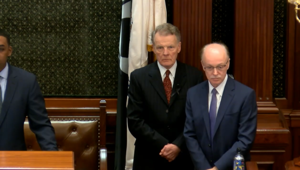(The Center Square) – A judge is expected to rule Wednesday on potential testimony from former state Rep. Eddie Acevedo, D-Chicago, as former Illinois House Speaker Michael Madigan’s corruption trial enters the AT&T phase.
Acevedo’s attorney said the former lawmaker has dementia, and defense attorneys for Madigan and codefendant Michael McClain objected to Acevedo testifying. The judge ruled that Acevedo, if called, would testify with immunity.
Acevedo was sentenced in 2022 to six months in prison for tax evasion. Prosecutors say Acevedo got paid by AT&T and ComEd for do-nothing jobs.
Former State Rep. Jeanne Ives, R-Wheaton, said Acevedo was a Madigan ally.
“Eddie Acevedo was a useful idiot. He didn’t know his legislation. He was given his talking points from staff. He passed whatever they wanted. He was just a tool in Madigan’s toolbox, and that’s all he was,” Ives told The Center Square.
Judge John Robert Blakey met with Acevedo in his chamber Tuesday afternoon and said he would make a ruling Wednesday morning.
All parties agreed to the judge’s suggestion that if Acevedo is found competent, he would provide video testimony before being called to the witness stand. Blakey said there would at least be a statement from the witness in case he were to engage in misconduct or subterfuge during testimony. Prosecutors and defense attorneys agreed that they would not use the potential video testimony during closing arguments.
Earlier Tuesday, Blakey overruled objections from both defense teams over the admissibility of evidence related to AT&T and said he would later provide his written findings on the issue.
Madigan attorney Dan Collins argued the AT&T exhibits should not be admissible without testimony from Steve Selcke, a former AT&T employee who testified during the trial of former AT&T executive Paul La Schiazza earlier this year.
A judge declared a mistrial in September after a jury deadlocked 11-1 on charges alleging that La Schiazza bribed Madigan.
After Blakey’s ruling Tuesday, Madigan attorney Todd Pugh said the defense team would subpoena Selcke to testify.
Prosecutor Sarah Streicker called AT&T executive Deno Perdiou to the witness stand Tuesday afternoon. Perdiou has worked for AT&T since 1998. Prior to joining the telecommunications company, Perdiou was director of Legislative Affairs for Illinois Gov. Jim Edgar.
Perdiou said he reported to AT&T President Paul La Schiazza. Perdiou testified about carrier-of-last-resort legislation in the General Assembly related to AT&T. Perdiou said several COLR relief bills failed before AT&T officials met with Madigan in 2017 to discuss a measure proposed by AT&T.
Streicker introduced an email from February 2017 from McClain asking AT&T executive Bob Barry if there was a small contract for Acevedo.
Streicker also displayed an email from among AT&T executives in May of 2017, which stated that Madigan legal counsel Heather Wier Vaught’s direction from the speaker was to develop a bill to assist AT&T.
Perdiou is expected to provide additional testimony on Wednesday.
Prosecutor Amar Bhachu called former state Rep. Avery Bourne, R-Morrisonville, to the witness stand Tuesday morning. Bourne said she now does communications work as an independent contractor. She served in the Illinois House from 2015 to 2023.
Bourne discussed a land-transfer bill she hoped to pass late in the 2018 spring legislative session. Bourne said Springfield lobbyist Ryan McCreery asked her to attach an amendment to include a land parcel in Chicago’s Chinatown neighborhood. The amendment sought to transfer land from the state of Illinois to the city of Chicago for a proposed development project on a Chinatown parking lot. Prosecutors have alleged that the proposed Chinatown land transfer involved an attempt to steer business to Madigan’s private law firm, Madigan and Getzendanner.
Bourne said she opposed the amendment because of concerns addressed by the Illinois Department of Transportation, but she understood that her land transfer bill would be dead if she did not add the amendment favored by the speaker.
Bourne said she was willing to file the amendment without attaching it to her bill. Bourne said there was no vote on her bill or the amendment during the legislative session. She then asked that the amendment be tabled with the intention of killing it.
Bourne said then-Illinois House Minority Leader Jim Durkin, R-Western Springs, later asked her to transfer the bill to then-state Rep. Dan Burke, D-Chicago, during the fall veto session.
Bourne texted in response, “If you think that’s the right thing, then yes. But I’m not comfortable with it, so I will most likely not support the bill.”
The bill was not transferred to Burke, and Bourne’s legislation passed during the fall veto session without the Chinatown amendment.
Bhachu asked Bourne who had the final word on whether legislation passed.
“The Speaker’s office,” Bourne answered.
Last week, prosecutors played recordings of lobbyist Nancy Kimme and McClain discussing Bourne and the proposed Chinatown amendment.
In a call on May 28, 2018, McClain referred to Madigan aide Justin Cox when he asked Kimme to update the bill’s language.
“He’s gonna call ya, because he thinks that you shouldn’t have any trouble but should ask the Republican sponsors of that bill to put that language on that bill,” McClain told Kimme.
“On what bill?” Kimme asked.
“On, you know, that bill that I gave you,” McClain answered.
“Yeah, the one that Avery Bourne has?” Kimme asked.
“Right,” McClain said.
“Fowler and Bourne,” Kimme asked.
“Yeah,” McClain said.
“Yes. OK. So, he thinks that I should ask Avery?” Kimme said.
On May 31st, the last day of the legislative session, Kimme updated McClain.
“Here’s the latest. Avery’s willing to file the amendment, but she doesn’t want to call the bill,” Kimme said.
Bourne is the fourth former Illinois lawmaker to testify during the trial, joining former state Reps. Carol Sente, D-Vernon Hills, Scott Drury, D-Highwood, and Lou Lang, D-Skokie. Current state Rep. Bob Rita, D-Blue Island, testified for about 10 minutes in October and current U.S. Rep. Nikki Budzinski testified on Monday.
McCreery reported to the witness box before Bourne. McCreery said he has worked for his own firm, McCreery Consulting, since 2017 and also does contract work for Kimme’s firm, Advantage Government Strategies. Kimme testified last week about attempts to transfer the Chinatown land parcel.
McCreery served as a deputy director for the Illinois Environmental Protection Agency for two years during Bruce Rauner’s term as governor and previously worked for about four years as a field coordinator for the Illinois Republican Party.
McCreery said he prepared a proposed memo for state Rep. Theresa Mah, D-Chicago, to send to then-Madigan chief of staff Tim Mapes regarding sites, including the Chinatown parcel, for a land-transfer bill in the General Assembly.
McCreery said he then found out that Mah did not support the land-transfer effort.
Government attorneys introduced communications between McCreery and members of Madigan’s staff regarding the Chinatown parcel.
McCreery said he met with Bourne about the Chinatown land transfer. McCreery said Bourne was skeptical about the proposal but eventually added the amendment to a bill which was never called for a vote.
McCreery said he went directly from working in government to working as a lobbyist, which he said is a common practice in Illinois.
Madigan served in the Illinois House for 50 years and chaired the Democratic Party of Illinois for 23 years.
McClain is a former state representative and lobbyist.
Madigan and McClain are charged with 23 counts of bribery, racketeering and official misconduct.
United States of America v. Madigan et al is scheduled to resume Thursday at the Everett McKinley Dirksen U.S. Courthouse in Chicago.
Prosecutors indicated that they expect to rest their case next Monday or Tuesday. Defense attorneys would follow with their cases. Closing arguments are projected to happen after Christmas.





